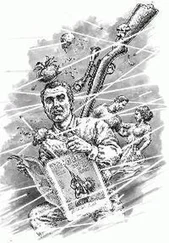Аврам Дэвидсон - Peregrine - primus
Здесь есть возможность читать онлайн «Аврам Дэвидсон - Peregrine - primus» весь текст электронной книги совершенно бесплатно (целиком полную версию без сокращений). В некоторых случаях можно слушать аудио, скачать через торрент в формате fb2 и присутствует краткое содержание. Год выпуска: 1971, ISBN: 1971, Издательство: New York : Walker, Жанр: sf_all, на английском языке. Описание произведения, (предисловие) а так же отзывы посетителей доступны на портале библиотеки ЛибКат.
- Название:Peregrine : primus
- Автор:
- Издательство:New York : Walker
- Жанр:
- Год:1971
- ISBN:0802755461
- Рейтинг книги:5 / 5. Голосов: 1
-
Избранное:Добавить в избранное
- Отзывы:
-
Ваша оценка:
- 100
- 1
- 2
- 3
- 4
- 5
Peregrine : primus: краткое содержание, описание и аннотация
Предлагаем к чтению аннотацию, описание, краткое содержание или предисловие (зависит от того, что написал сам автор книги «Peregrine : primus»). Если вы не нашли необходимую информацию о книге — напишите в комментариях, мы постараемся отыскать её.
Peregrine : primus — читать онлайн бесплатно полную книгу (весь текст) целиком
Ниже представлен текст книги, разбитый по страницам. Система сохранения места последней прочитанной страницы, позволяет с удобством читать онлайн бесплатно книгу «Peregrine : primus», без необходимости каждый раз заново искать на чём Вы остановились. Поставьте закладку, и сможете в любой момент перейти на страницу, на которой закончили чтение.
Интервал:
Закладка:
AVRAM DAVIDSON
[ 75 ]
tached to it, it was Appledore who came running and brought the catch (a tine sterlet) aboard, deftly killed and cleaned it, and deftly set a caboose of coals to burning and busied himself with garlic and garum and parsley and salt and oil.
Peregrine, licking his fingers contentedly, watched the plump hills sliding by, the tilth and woodland, the vineyards and the meadows, green where the sun shone on it and blue where the clouds intruded between sun and shore. A smaller stream entered the main How not far ahead, and on a small neck of land between the two unequal waters a townlet sat staunchly. Eugenius gestured to Peregrine.
“Now, carefully note and observe,” he instructed him, “that the prow is pointed dead set between those two huge trees on yonder island, eh? Keep her so, till and until and unless I bid you otherwise,” and with that he relinquished the tiller, and stood upon the half-lid of the squat water butt and shaded his eyes and gazed ashore. Peregrine stared at the prow and concentrated upon keeping it centered between the two trees until he almost felt his eyes crossing.
“I am unsure,” Eugenius said, low-voiced. “I am uncertain. Yonder is Calicum, a prosperous enough wee port with an hundred looms, give or take a few; usually a good port to put into with wool and fells. But now ... I am not persuaded .... It does look quiet . . . perhaps it looks too quiet . . . Well, in another moment I must make up my mind, or the current will not carry us there, howe’er so much I turn my tiller, and to beat upstream would— Ah, woe!”
And hard upon his lamentation, from out of nowhere that Peregrine could clearly observe, a long low vessel legged with many oars darted forth and raced forward across the water like a living thing starved for and intent on prey, its limbs flashing in the sunlight. Peregrine jumped up and then as swiftly sat down again, then took a swift look all about: but nowhere might he see any other vessel or destination or object which could have caused the Eddessan’s alarm.
“Is that not a galley?” asked he. “And is it coming after us? And for what and for why? And what shall we do?”
In his ear, Appledore said, “It is not only a galley, it is a dromon, and if it is not the swiftest ship upon this stretch of water, ’twill do far that description.”
And Eugenius, with a gesture, swept Peregrine from the tiller, and abruptly changed the course of his own slow sailing-barge: and at that time, a sound, faint but emphatic, came cracking over the water. But by the time it reached their eyes, the dromon had also changed course, and still it headed for them, and for them, (it seemed) alone.
“Jettison the cargo!” ordered Eugenius.
“He means, throw the bales overboard,” Appledore translated. “Go, now! Move boys!”
Peregrine had more than once played some small and light role at shearing-time at home, and the smell of sheep-suint and sheep-sweat and sheep-oil had brought it back to his memory again. But in an instant more he learned that while a fleece is a light weight to toss, an hundred fleeces bounded and bonded into a bale are a less light weight indeed. Claud at that moment broke the spell which had held him fast, and, forgetful of previous fears, clambered down and took hold of the rough drugget which contained the pressed wools. With a heave and a strain and a drag, they got it to the side—and let it escape from their dragging fingers into the dappled wetness alongside and beneath; one brief moment they watched it sink, then dragged themselves away, and took the next; by the time they returned with the second, the first had bobbed to the surface. Appledore, unseen, instead of lending a hand, had seemingly given himself over to despair, and of him they could hear only a wailing chant.
Within a matter of moments Peregrine’s hair, sweat-wet and slicked, was obscuring his eyes, and he hoped that Claud could see where they were going; he tugged, he allowed himself to be tugged and dragged.
Once, indeed, the bale having slipped, he allowed himself a second to wipe his eyes clear, and saw the dromon lunging forward. Then he bent again to his task. The wailing chant went on and on and it seemed unendurable; he could hear the bong-bongbong of the semantron, as the bailiff on the dromon relentlessly, remorselessly beat out the rhythm for the rowers. And he could hear the sharp, crisp, and—it seemed—cruel commands— although he could make nothing of the words themselves— which someone, presumably an officer, was issuing: and he could imagine that they referred to such things as he had heard and read of (far-off days, a million years behind, he and Austin
AVRAM DAVIDSON
[ 77 ]
small boys in some small and clean room in the palace precincts back in Sapodilla, and Appledore as tutor), grappling-hooks and the short swords used in close combat.
And then he heard something else, heard the officer’s voice rising, going out of control, heard half a hundred voices suddenly drown the other out, heard alarm, heard fear, heard the tone of command regain control and, barely kept within control and high-pitched, issue another order, this one very rapid, broken off
heard a sound he had never in his life before heard, barely even imagined, like that of a hundred wagons crashing together (this, the best he was able to do, in that one flashing second, towards explaining what he heard to himself)—and the screams, and the screaming—
Where but a breathing-space before he had seen the dromon coursing down the stream and all the bales of wool bobbing before in its path, now he saw the stream studded with rocks, each the size of a bale of wool, saw the dromon at an impossible angle—what speed! with what speed must she have rushed to her destruction despite all attempts—hanging halfway in the air and halfway on its side, and oddest of all how some of the oars still rowed—men slipping into the water, men striving desperately not to slip, men bobbing in the water like bales of wool, though so oh much smaller—
Twisting and turning his head, Peregrine saw Eugenius desperately porting his helm, felt the barge respond, saw Appledore, was aware that the droning chant was suddenly stopped, saw the rocks once more change to bales of wool, saw the dromon slip down and under and under and— Saw Appledore’s cheeks fill with breath, heard the strange sharp whistle, which long long later he was to identify as the sound of a wind-borne sea-bird in a certain Northern Sea, heard the sail, which had been luffing, suddenly fill with wind. Saw faces very near in the water. Saw one set of eyes take hold of his own, saw that one face mark his own face, knew that they would know each other’s faces if they were to meet a century later at the farthest end of the Erythrian Sea, or farther . . .
Eugenius huddled at his helm, the wind rose high, the sailingbarge charged forward, the island and its two trees, the port of Calicum and its hundred looms fell, all fell, fell far behind.
The furrow followed free.
For a long, long time no one said anything. Then Appledore, in an abstracted manner, slowly drew from the water the line holding his garments, undid the knot, wrung them out, and began to put them on, breaking the silence with the low-voiced comment that they would dry on him. Eugenius seemed to come-to with a start.
“Nay, nay,” he said. “For all that as a good Gnostic Christian I should abstain from all sorts of magic, yet under the circumstances I cannot find it in me to do other than to feel appreciative for your twain favor to me, that is, in changing the bales of wool into rocks to wreck that damned dromon, and then in raising a wind and thus enabling us to get far from the reach of any second dromon, or for that matter any other craft which might have been havening at Calicum . . . and, for that matter, of any of the ship’s survivors who might have attempted to board us from the water . . .
Читать дальшеИнтервал:
Закладка:
Похожие книги на «Peregrine : primus»
Представляем Вашему вниманию похожие книги на «Peregrine : primus» списком для выбора. Мы отобрали схожую по названию и смыслу литературу в надежде предоставить читателям больше вариантов отыскать новые, интересные, ещё непрочитанные произведения.
Обсуждение, отзывы о книге «Peregrine : primus» и просто собственные мнения читателей. Оставьте ваши комментарии, напишите, что Вы думаете о произведении, его смысле или главных героях. Укажите что конкретно понравилось, а что нет, и почему Вы так считаете.






